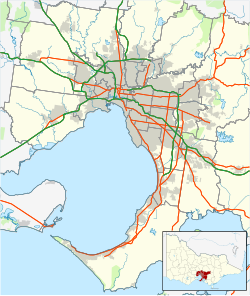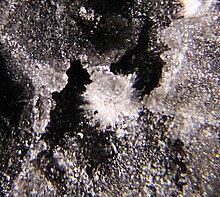IKZF1
IKZF1DNA결합단백질 Ikaros패밀리 아연핑거단백질 [5][6][7]1은 IKZF1유전자에 의해 인체 내에서 암호화되는 단백질이다.
Ikaros - 전사율
Ikaros는 Ikaros 계열의 아연 핑거 그룹의 IKZF 유전자에 의해 부호화된 전사 인자입니다.아연 핑거는 DNA 또는 RNA 분자에 단백질이 결합할 수 있도록 하는 단백질의 작은 구조적 모티브로, 접힌 부분을 안정시키기 위해 하나 이상의 아연 이온(Zn2+)의 배위에 의해 특징지어진다.
Ikaros는 조혈계에서 중요한 기능을 나타내며 주로 초기 B 세포인 CD4+ T 세포에서 면역 세포 발달의 알려진 조절자이다.그것의 기능 장애는 만성 림프구 [8][9]백혈병의 발병과 관련이 있다.특히 Ikaros는 인간 B세포 급성 림프아구성[8] 백혈병에 관여하는 주요 종양 억제제이며 개별 T도우미 [10]세포의 분화 및 기능에도 관여하는 것으로 최근 몇 년 동안 밝혀졌다.
Ikaros는 또한 항체 이성질체의 스위치 클래스 [11]및 B세포 수용체의 발현에서 VDJ 재결합 중 B세포 발달의 후기 단계에서 역할을 한다.
Ikaros 녹아웃 마우스에서는 관련 유전자 Aiolos(IKZF3)[12]의 늦은 보상 발현으로 인해 마우스 발육이 늦어지고 B세포가 아닌 T세포가 생성된다.Ikaros 포인트 돌연변이 생쥐는 빈혈로 인한 배아 치사성으로 말단 적혈구 및 과립구 분화에 심각한 결함이 있으며 대식세포 [13]형성이 과도하다.인간의 IKZF1의 3' 영역 근처에 위치한 SNP는 1형 [15]당뇨병뿐만 아니라 소아 급성 림프아구성 백혈병([14]ALL)에 대한 감수성과 관련이 있다.두 가지 효과는 반대 방향으로 나타나며, 대립 유전자가 T1D로부터 모두 보호되기 쉽도록 표시되며,[15] 그 반대도 마찬가지입니다.
이카로스 아연 핑거 패밀리 유전자
이카로스 아연 핑거(IkZF) 계열의 전사 인자는 조혈세포 발달과 CD4+ T세포를 포함한 많은 면역세포를 조절하는 것으로 알려져 있다.
IkZF 패밀리는 5개의 멤버로 구성됩니다.이카로스(Ikzf1 유전자에 의해 인코딩됨), 헬리오스(Ikzf2), 아이올로스(Ikzf3), 에오스(Ikzf4), 페가수스(Ikzf5) 등이다.이들 인자는 DNA와의 직접적인 상호작용을 중개하는 역할을 하는 N 말단 아연 핑거(ZF) 도메인과 IkZF 패밀리 간의 호모 및 헤테로다이머화를 촉진하는 C 말단 ZF를 포함한다.[16]
IKZF1은 과립구, B세포, CD4, CD8 T세포 및 NK세포에서 상향조절되고 적혈구,[17] 거핵구 및 단구에서는 하향조절된다.
이카로스 결핍증
IKZF1 유전자의 돌연변이는 Ikaros 전사 인자의 기능 장애를 일으킬 수 있다.기능 장애는 B세포의 발현에 영향을 미쳐 B세포가 발달하는 동안 BCR 시그널링의 규제 해제를 초래할 수 있으며 B세포의 변환과 관련이 있다.규제완화는 낮은 증식율과 B세포의 아포토시스 증가를 초래할 수 있다.규제완화는 림프증식장애와 다른 형태의 백혈병과 관련이 있을 수 있다.[18]
상호 작용
IKZF1은 다음과 상호작용하는 것으로 나타났습니다.
레퍼런스
- ^ a b c GRCh38: 앙상블 릴리즈 89: ENSG00000185811 - 앙상블, 2017년 5월
- ^ a b c GRCm38: 앙상블 릴리즈 89: ENSMUSG000018654 - 앙상블, 2017년 5월
- ^ "Human PubMed Reference:". National Center for Biotechnology Information, U.S. National Library of Medicine.
- ^ "Mouse PubMed Reference:". National Center for Biotechnology Information, U.S. National Library of Medicine.
- ^ Georgopoulos K, Moore DD, Derfler B (October 1992). "Ikaros, an early lymphoid-specific transcription factor and a putative mediator for T cell commitment". Science. 258 (5083): 808–12. Bibcode:1992Sci...258..808G. doi:10.1126/science.1439790. PMID 1439790.
- ^ Hahm K, Ernst P, Lo K, Kim GS, Turck C, Smale ST (November 1994). "The lymphoid transcription factor LyF-1 is encoded by specific, alternatively spliced mRNAs derived from the Ikaros gene". Molecular and Cellular Biology. 14 (11): 7111–23. doi:10.1128/mcb.14.11.7111. PMC 359245. PMID 7935426.
- ^ "Entrez Gene: IKZF1 IKAROS family zinc finger 1 (Ikaros)".
- ^ a b Kastner P, Chan S (June 2011). "Role of Ikaros in T-cell acute lymphoblastic leukemia". World Journal of Biological Chemistry. 2 (6): 108–14. doi:10.4331/wjbc.v2.i6.108. PMC 3135856. PMID 21765975.
- ^ Oliveira VC, Lacerda MP, Moraes BB, Gomes CP, Maricato JT, Souza OF, et al. (July 2019). "Deregulation of Ikaros expression in B-1 cells: New insights in the malignant transformation to chronic lymphocytic leukemia". Journal of Leukocyte Biology. 106 (3): 581–594. doi:10.1002/JLB.MA1118-454R. PMID 31299112. S2CID 196350761.
- ^ Powell MD, Read KA, Sreekumar BK, Oestreich KJ (2019). "+ T Helper Cell Differentiation". Frontiers in Immunology. 10: 1299. doi:10.3389/fimmu.2019.01299. PMC 6563078. PMID 31244845.
- ^ Sellars M, Kastner P, Chan S (June 2011). "Ikaros in B cell development and function". World Journal of Biological Chemistry. 2 (6): 132–9. doi:10.4331/wjbc.v2.i6.132. PMC 3135860. PMID 21765979.
- ^ Georgopoulos K, Winandy S, Avitahl N (1997). "The role of the Ikaros gene in lymphocyte development and homeostasis". Annual Review of Immunology. 15: 155–76. doi:10.1146/annurev.immunol.15.1.155. PMID 9143685.
- ^ Papathanasiou P, Perkins AC, Cobb BS, Ferrini R, Sridharan R, Hoyne GF, et al. (July 2003). "Widespread failure of hematolymphoid differentiation caused by a recessive niche-filling allele of the Ikaros transcription factor". Immunity. 19 (1): 131–44. doi:10.1016/s1074-7613(03)00168-7. PMID 12871645.
- ^ Papaemmanuil E, Hosking FJ, Vijayakrishnan J, Price A, Olver B, Sheridan E, et al. (September 2009). "Loci on 7p12.2, 10q21.2 and 14q11.2 are associated with risk of childhood acute lymphoblastic leukemia". Nature Genetics. 41 (9): 1006–10. doi:10.1038/ng.430. PMC 4915548. PMID 19684604.
- ^ a b Swafford AD, Howson JM, Davison LJ, Wallace C, Smyth DJ, Schuilenburg H, et al. (March 2011). "An allele of IKZF1 (Ikaros) conferring susceptibility to childhood acute lymphoblastic leukemia protects against type 1 diabetes". Diabetes. 60 (3): 1041–4. doi:10.2337/db10-0446. PMC 3046822. PMID 21270240.
- ^ Powell MD, Read KA, Sreekumar BK, Oestreich KJ (2019-06-06). "+ T Helper Cell Differentiation". Frontiers in Immunology. 10: 1299. doi:10.3389/fimmu.2019.01299. PMC 6563078. PMID 31244845.
- ^ Watkins NA, Gusnanto A, de Bono B, De S, Miranda-Saavedra D, Hardie DL, et al. (May 2009). "A HaemAtlas: characterizing gene expression in differentiated human blood cells". Blood. 113 (19): e1-9. doi:10.1182/blood-2008-06-162958. PMC 2680378. PMID 19228925.
- ^ Oliveira VC, Lacerda MP, Moraes BB, Gomes CP, Maricato JT, Souza OF, et al. (July 2019). "Deregulation of Ikaros expression in B-1 cells: New insights in the malignant transformation to chronic lymphocytic leukemia". Journal of Leukocyte Biology. 106 (3): 581–594. doi:10.1002/JLB.MA1118-454R. PMID 31299112. S2CID 196350761.
- ^ Koipally J, Georgopoulos K (June 2000). "Ikaros interactions with CtBP reveal a repression mechanism that is independent of histone deacetylase activity". The Journal of Biological Chemistry. 275 (26): 19594–602. doi:10.1074/jbc.M000254200. PMID 10766745.
- ^ a b c d Koipally J, Renold A, Kim J, Georgopoulos K (June 1999). "Repression by Ikaros and Aiolos is mediated through histone deacetylase complexes". The EMBO Journal. 18 (11): 3090–100. doi:10.1093/emboj/18.11.3090. PMC 1171390. PMID 10357820.
- ^ a b c d e Koipally J, Georgopoulos K (August 2002). "A molecular dissection of the repression circuitry of Ikaros". The Journal of Biological Chemistry. 277 (31): 27697–705. doi:10.1074/jbc.M201694200. PMID 12015313.
- ^ Kelley CM, Ikeda T, Koipally J, Avitahl N, Wu L, Georgopoulos K, Morgan BA (April 1998). "Helios, a novel dimerization partner of Ikaros expressed in the earliest hematopoietic progenitors". Current Biology. 8 (9): 508–15. doi:10.1016/s0960-9822(98)70202-7. PMID 9560339. S2CID 17835058.
- ^ Morgan B, Sun L, Avitahl N, Andrikopoulos K, Ikeda T, Gonzales E, et al. (April 1997). "Aiolos, a lymphoid restricted transcription factor that interacts with Ikaros to regulate lymphocyte differentiation". The EMBO Journal. 16 (8): 2004–13. doi:10.1093/emboj/16.8.2004. PMC 1169803. PMID 9155026.
- ^ Kim J, Sif S, Jones B, Jackson A, Koipally J, Heller E, et al. (March 1999). "Ikaros DNA-binding proteins direct formation of chromatin remodeling complexes in lymphocytes". Immunity. 10 (3): 345–55. doi:10.1016/s1074-7613(00)80034-5. PMID 10204490.
- ^ Honma Y, Kiyosawa H, Mori T, Oguri A, Nikaido T, Kanazawa K, et al. (March 1999). "Eos: a novel member of the Ikaros gene family expressed predominantly in the developing nervous system". FEBS Letters. 447 (1): 76–80. doi:10.1016/s0014-5793(99)00265-3. PMID 10218586. S2CID 28898354.
- ^ Perdomo J, Holmes M, Chong B, Crossley M (December 2000). "Eos and pegasus, two members of the Ikaros family of proteins with distinct DNA binding activities". The Journal of Biological Chemistry. 275 (49): 38347–54. doi:10.1074/jbc.M005457200. PMID 10978333.
- ^ Koipally J, Georgopoulos K (June 2002). "Ikaros-CtIP interactions do not require C-terminal binding protein and participate in a deacetylase-independent mode of repression". The Journal of Biological Chemistry. 277 (26): 23143–9. doi:10.1074/jbc.M202079200. PMID 11959865.
- ^ Katsumura KR, Bresnick EH (April 2017). "The GATA factor revolution in hematology". Blood. 129 (15): 2092–2102. doi:10.1182/blood-2016-09-687871. PMC 5391619. PMID 28179282.
추가 정보
- Tonnelle C, Calmels B, Maroc C, Gabert J, Chabannon C (January 2002). "Ikaros gene expression and leukemia". Leukemia & Lymphoma. 43 (1): 29–35. doi:10.1080/10428190210186. PMID 11908734. S2CID 23932398.
- Westman BJ, Mackay JP, Gell D (October 2002). "Ikaros: a key regulator of haematopoiesis". The International Journal of Biochemistry & Cell Biology. 34 (10): 1304–7. doi:10.1016/S1357-2725(02)00070-5. PMID 12127581.
- Molnár A, Wu P, Largespada DA, Vortkamp A, Scherer S, Copeland NG, et al. (January 1996). "The Ikaros gene encodes a family of lymphocyte-restricted zinc finger DNA binding proteins, highly conserved in human and mouse". Journal of Immunology. 156 (2): 585–92. PMID 8543809.
- Nietfeld W, Meyerhans A (January 1996). "Cloning and sequencing of hIk-1, a cDNA encoding a human homologue of mouse Ikaros/LyF-1". Immunology Letters. 49 (1–2): 139–41. doi:10.1016/0165-2478(95)02479-4. PMID 8964602.
- Morgan B, Sun L, Avitahl N, Andrikopoulos K, Ikeda T, Gonzales E, et al. (April 1997). "Aiolos, a lymphoid restricted transcription factor that interacts with Ikaros to regulate lymphocyte differentiation". The EMBO Journal. 16 (8): 2004–13. doi:10.1093/emboj/16.8.2004. PMC 1169803. PMID 9155026.
- Kelley CM, Ikeda T, Koipally J, Avitahl N, Wu L, Georgopoulos K, Morgan BA (April 1998). "Helios, a novel dimerization partner of Ikaros expressed in the earliest hematopoietic progenitors". Current Biology. 8 (9): 508–15. doi:10.1016/S0960-9822(98)70202-7. PMID 9560339. S2CID 17835058.
- Sun L, Heerema N, Crotty L, Wu X, Navara C, Vassilev A, et al. (January 1999). "Expression of dominant-negative and mutant isoforms of the antileukemic transcription factor Ikaros in infant acute lymphoblastic leukemia". Proceedings of the National Academy of Sciences of the United States of America. 96 (2): 680–5. Bibcode:1999PNAS...96..680S. doi:10.1073/pnas.96.2.680. PMC 15196. PMID 9892693.
- Kim J, Sif S, Jones B, Jackson A, Koipally J, Heller E, et al. (March 1999). "Ikaros DNA-binding proteins direct formation of chromatin remodeling complexes in lymphocytes". Immunity. 10 (3): 345–55. doi:10.1016/S1074-7613(00)80034-5. PMID 10204490.
- Honma Y, Kiyosawa H, Mori T, Oguri A, Nikaido T, Kanazawa K, et al. (March 1999). "Eos: a novel member of the Ikaros gene family expressed predominantly in the developing nervous system". FEBS Letters. 447 (1): 76–80. doi:10.1016/S0014-5793(99)00265-3. PMID 10218586. S2CID 28898354.
- Koipally J, Renold A, Kim J, Georgopoulos K (June 1999). "Repression by Ikaros and Aiolos is mediated through histone deacetylase complexes". The EMBO Journal. 18 (11): 3090–100. doi:10.1093/emboj/18.11.3090. PMC 1171390. PMID 10357820.
- Sun L, Goodman PA, Wood CM, Crotty ML, Sensel M, Sather H, et al. (December 1999). "Expression of aberrantly spliced oncogenic ikaros isoforms in childhood acute lymphoblastic leukemia". Journal of Clinical Oncology. 17 (12): 3753–66. doi:10.1200/JCO.1999.17.12.3753. PMID 10577847.
- Hosokawa Y, Maeda Y, Ichinohasama R, Miura I, Taniwaki M, Seto M (April 2000). "The Ikaros gene, a central regulator of lymphoid differentiation, fuses to the BCL6 gene as a result of t(3;7)(q27;p12) translocation in a patient with diffuse large B-cell lymphoma". Blood. 95 (8): 2719–21. doi:10.1182/blood.V95.8.2719. PMID 10753856.
- Koipally J, Georgopoulos K (June 2000). "Ikaros interactions with CtBP reveal a repression mechanism that is independent of histone deacetylase activity". The Journal of Biological Chemistry. 275 (26): 19594–602. doi:10.1074/jbc.M000254200. PMID 10766745.
- Perdomo J, Holmes M, Chong B, Crossley M (December 2000). "Eos and pegasus, two members of the Ikaros family of proteins with distinct DNA binding activities". The Journal of Biological Chemistry. 275 (49): 38347–54. doi:10.1074/jbc.M005457200. PMID 10978333.
- Payne KJ, Nicolas JH, Zhu JY, Barsky LW, Crooks GM (August 2001). "Cutting edge: predominant expression of a novel Ikaros isoform in normal human hemopoiesis". Journal of Immunology. 167 (4): 1867–70. doi:10.4049/jimmunol.167.4.1867. PMID 11489963.
- Koipally J, Heller EJ, Seavitt JR, Georgopoulos K (April 2002). "Unconventional potentiation of gene expression by Ikaros". The Journal of Biological Chemistry. 277 (15): 13007–15. doi:10.1074/jbc.M111371200. PMID 11799125.
- Dorsam G, Goetzl EJ (April 2002). "Vasoactive intestinal peptide receptor-1 (VPAC-1) is a novel gene target of the hemolymphopoietic transcription factor Ikaros". The Journal of Biological Chemistry. 277 (16): 13488–93. doi:10.1074/jbc.M107922200. PMID 11812772.
외부 링크
- IKZF1+단백질+미국국립의학도서관 의학 과목 제목(MeSH)
- UCSC Genome Browser에서 IKZF1 인간 유전자 위치.
- UCSC 게놈 브라우저의 IKZF1 인간 유전자 상세.








